by Jen Johnston, CHHC, senior marketing services account manager, for the Step into Natural blog series
It seems like every natural product has a handful of certifications, verifications, accreditations, or approvals, typically illustrated on the package through the use of symbols or icons. Brands include these icons to gain credibility among consumers, and it seems to be working.
A broad consumer products survey conducted by Natural Marketing Institute (NMI) indicated that consumers are more likely to purchase a product with these certifications:
- Energy Star (63 percent)
- Recycled logo (44 percent )
- USDA Organic (37 percent—a 29 percent change since 2007)
- Non-GMO Project Verified (33 percent)
- Fair Trade Certified (26 percent—a 15 percent change since 2007)
- Rainforest Alliance Certified (23 percent)
- UL Environment (21 percent)
- Marine Stewardship Council (13 percent—a 5 percent change since 2007)
It is important to note while many of the certifications are backed by legitimate organizations, nothing prevents a brand from expressing a claim with their own official-looking, self-designed emblem.
About once a month during this blog series, I will share with you a handful of certifications that you should be aware of as they may appear on the products you sell and your customers may ask questions about them.
Non-GMO Project Verified
The Non-GMO Project is a non-profit organization focusing on genetically modified organisms (GMOs). They offer verification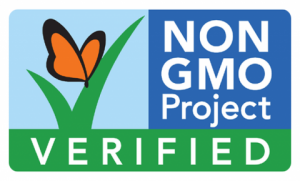 for food, personal care, and over-the-counter products to ensure items do not contain GMOs. The verification is process-based, using traceability, segregation, quality control, and other testing to ensure compliance with their standards. According to nongmoproject.com, there are more than 50,000 verified products for over 3,000 brands. Their website lists the verified body care and vitamin and supplement brands, along with snack foods and bars, in case you are interested in meeting the needs of those customers who seek non-GMO products. Later this year, I will take a deep dive into GMO and what current consumer perception is. Stores that offer Non-GMO Project Verified brands can register to be featured on the retailer portion of the website.
for food, personal care, and over-the-counter products to ensure items do not contain GMOs. The verification is process-based, using traceability, segregation, quality control, and other testing to ensure compliance with their standards. According to nongmoproject.com, there are more than 50,000 verified products for over 3,000 brands. Their website lists the verified body care and vitamin and supplement brands, along with snack foods and bars, in case you are interested in meeting the needs of those customers who seek non-GMO products. Later this year, I will take a deep dive into GMO and what current consumer perception is. Stores that offer Non-GMO Project Verified brands can register to be featured on the retailer portion of the website.
Certified Gluten Free®
In 2014, the U.S. Food and Drug Administration (FDA) defined the term “gluten-free” for voluntary use in the labeling of foods as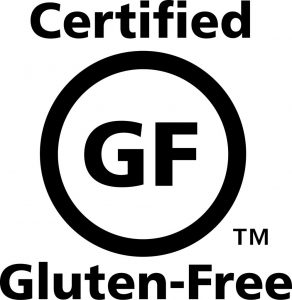 containing less than 20 ppm gluten. Many people with celiac disease or non-celiac gluten sensitivity say they still react to lower ppm of gluten, therefore the Gluten Intolerance Group developed a certification that requires all finished products bearing its logo to contain 10ppm or less of gluten. This logo appears on not only food but also OTCs, personal care products, and makeup. Those who must strictly adhere to gluten-free diets often purchase gluten-free non-food items to avoid accidental ingestion. Celiac disease, a hereditary autoimmune condition, affects about 3 million Americans, or roughly 1% of the population, according to the Celiac Disease Foundation.
containing less than 20 ppm gluten. Many people with celiac disease or non-celiac gluten sensitivity say they still react to lower ppm of gluten, therefore the Gluten Intolerance Group developed a certification that requires all finished products bearing its logo to contain 10ppm or less of gluten. This logo appears on not only food but also OTCs, personal care products, and makeup. Those who must strictly adhere to gluten-free diets often purchase gluten-free non-food items to avoid accidental ingestion. Celiac disease, a hereditary autoimmune condition, affects about 3 million Americans, or roughly 1% of the population, according to the Celiac Disease Foundation.
Certified Vegan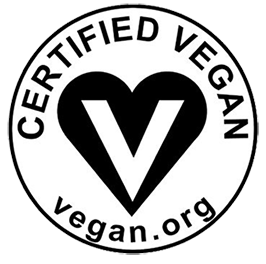
This vegan certification is managed by the Vegan Action/Vegan Awareness Foundation for products that do not contain animal products or byproducts and that have not been tested on animals. The certified logo helps vegans shop without constantly consulting ingredient lists. According to Top Trends in Prepared Foods 2017, 6% of U.S. consumers now claim to be vegan, up from just 1% in 2014.
Certified USDA Organic
USDA certified organic foods are grown and processed according to federal guidelines addressing, among many factors, soil quality, animal raising practices, pest and weed control, and use of additives. Organic producers rely on natural substances and 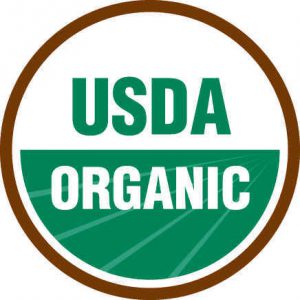 physical, mechanical, or biologically based farming methods to the fullest extent possible. Regulations prohibit organically processed foods from containing artificial preservatives, colors, or flavors and require that their ingredients are organic. According to The Balance Small Business, any cosmetic, body care product, or personal care product made with agricultural ingredients that meet the USDA National Organic Program (NOP) organic production, handling, processing and labeling standards, may be eligible for USDA organic certification under NOP. Homeopathic products, vitamins, and dietary supplements can also bear the USDA Organic Certification if they meet the standards. While the statistic is a little dated now, U.S. Sales of NOP organic dietary supplements were reported at $739 million, an increase of 8.5% over the previous year. I can only imagine they are much higher today.
physical, mechanical, or biologically based farming methods to the fullest extent possible. Regulations prohibit organically processed foods from containing artificial preservatives, colors, or flavors and require that their ingredients are organic. According to The Balance Small Business, any cosmetic, body care product, or personal care product made with agricultural ingredients that meet the USDA National Organic Program (NOP) organic production, handling, processing and labeling standards, may be eligible for USDA organic certification under NOP. Homeopathic products, vitamins, and dietary supplements can also bear the USDA Organic Certification if they meet the standards. While the statistic is a little dated now, U.S. Sales of NOP organic dietary supplements were reported at $739 million, an increase of 8.5% over the previous year. I can only imagine they are much higher today.
EWG VERIFIEDTM
The Environmental Working Group (EWG) is an environmental health non-profit, non-partisan organization dedicated to 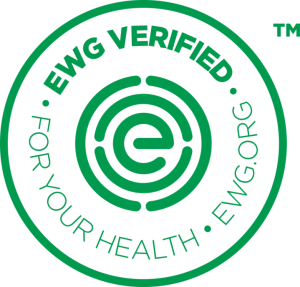 protecting human health and the environment through research and education. They maintain the Skin Deep® Cosmetics Database. Since 2015, they have offered the EWG VERIFIED emblem for personal care items that are free of substances on EWG’s “unacceptable” list and meet limits outlined in EWG’s “restricted” list. Ingredients on these lists have been banned or restricted by U.S. or international government agencies or other authoritative public health bodies, such as the World Health Organization. Companies seeking the EWG VERIFIED mark also have to fully disclose their products’ ingredients on their packaging and on their websites and follow good manufacturing practices.
protecting human health and the environment through research and education. They maintain the Skin Deep® Cosmetics Database. Since 2015, they have offered the EWG VERIFIED emblem for personal care items that are free of substances on EWG’s “unacceptable” list and meet limits outlined in EWG’s “restricted” list. Ingredients on these lists have been banned or restricted by U.S. or international government agencies or other authoritative public health bodies, such as the World Health Organization. Companies seeking the EWG VERIFIED mark also have to fully disclose their products’ ingredients on their packaging and on their websites and follow good manufacturing practices.

